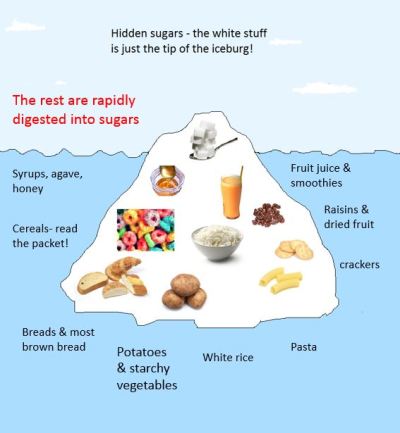Hi all, thought you might enjoy this image which was created by my wife Clare, who is a GP, to remind patients that white sugar is just the tip of the iceberg when it comes to foods that pump up your blood sugars. I have been following and writing about the dangers of over-consumption of sugar for some time, so I was interested to see that it has become a mainstream preoccupation. Lots of books out there promising low sugar menus. Some, however, seem to ignore the fact that honey and other forms of sugar are frankly just as bad when it comes to calories and effect on blood sugar levels. I don’t think that sugar is uniquely evil, but I do know that I have a terrible weakness for all things sweet which I battle with.
There is a Horizon special, “What’s the Right Diet for You” that goes out this evening and for the next two evenings on BBC2 and which is well worth taking a look at. You can also catch up later on iplayer. The Horizon team use scientific tests to divide potential dieters into 3 “tribes”: “emotional eaters”, “constant cravers” (people whose genetics put them at particular risk of obesity) and “feasters” (people who don’t seem to get the ‘I am full message’ while eating).
Each tribe is then given a different diet to try; Emotional Eaters get a standard low calorie diet with psychological support. Constant cravers are put on 5:2 intermittent fasting and “Feasters” on a high protein, low GI diet. I won’t spoil it by telling you the results
Best wishes to all of you,
Michael







10:18 am
12 Jan 15